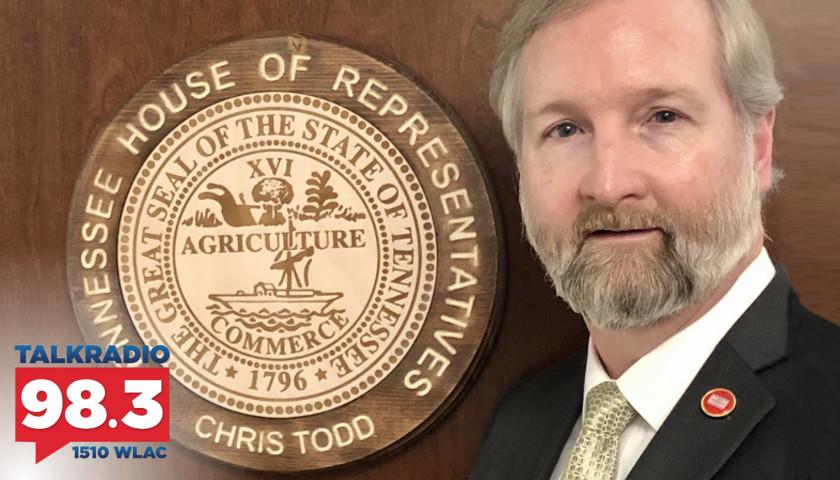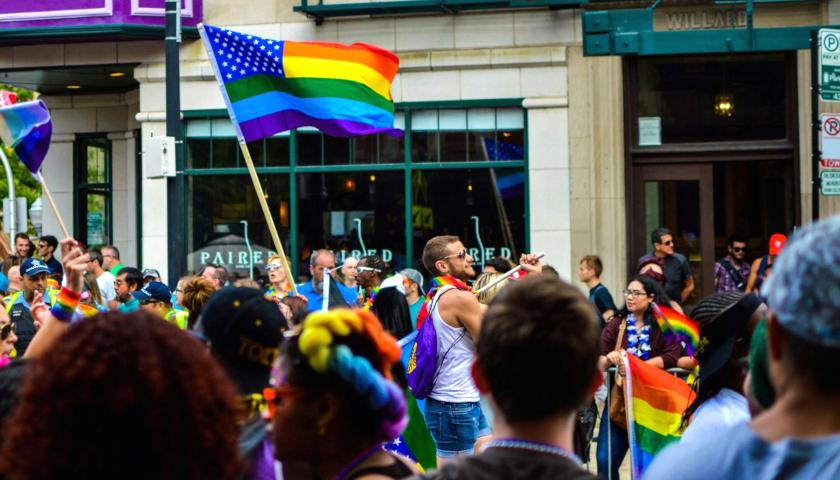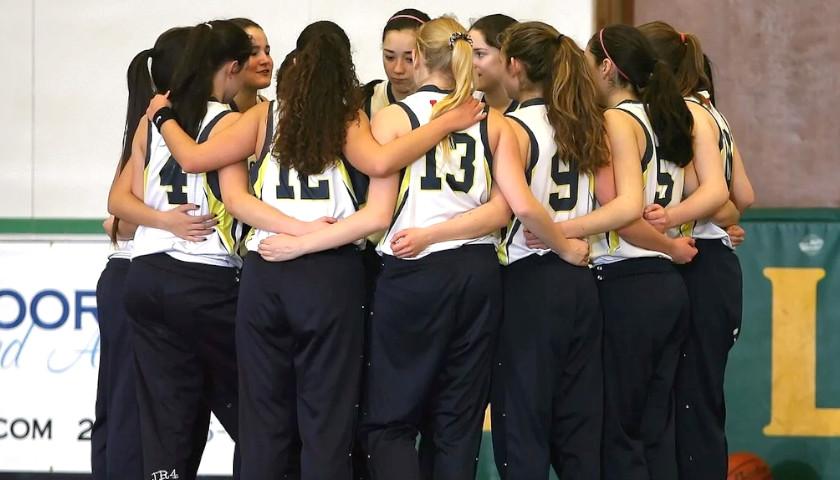Live from Music Row, Wednesday morning on The Tennessee Star Report with Michael Patrick Leahy – broadcast on Nashville’s Talk Radio 98.3 and 1510 WLAC weekdays from 5:00 a.m. to 8:00 a.m. – host Leahy welcomed State Representative Chris Todd from Jackson, Tennessee to the newsmaker line to detail his House bill that would prohibit young children from attending drag queen shows resulting in either misdemeanor or felony charges for the performers.
Leahy: We welcome to the newsmaker line our good friend, State Representative Chris Todd from Jackson. Good morning, Representative Todd.
Todd: Good morning, Brother Leahy. How are you today?
Leahy: I’m great. Are you here in town?
Todd: Yes, sir.
Leahy: Big session going on today.
Todd: Yes, sir. We’ve got a lot of business going on today.
Leahy: We appreciate you taking the time to call in and talk on our newsmaker lines. You’ve got a big bill out there having to do with prohibiting young children from attending these drag queen shows. Can you elaborate on the details of the bill and tell us where it stands in the legislative process?
Todd: Absolutely, yes, sir. What we’ve done, we’ve noticed over, especially last year, that there are some that feel like our prohibition of things like this in the law that have been in place for many, many years was unclear. And they’ve tried to skirt around that with different wordings and different meanings.
And so we’re trying to make that very clear that if it’s harmful to minors, which is already spelled out in our law, then you can’t do it in a public place or where children are present, period.
We’re trying to just close up loopholes so that these things cannot take place. And as a strict matter of fact, it doesn’t even mention drag queen shows or drag shows at all. It just describes the type of entertainment that minors do not need to be seeing.
And makes it very clear that there are only certain locations where you can have adult-only venues and where minors cannot see them. It’s pretty simple in that respect. And we’ve got it through the subcommittee last week in the House, and it’s up for the full committee next week. Senator Jack Johnson, Majority Leader I believe, has it all the way through the Senate ready for the Senate floor.
So I think they’re going for a floor vote I believe, actually tomorrow, if I understand correctly. I haven’t seen that calendar, but that was my understanding sometime yesterday. So they may have it all the way through the Senate, and then we’ll get it through the House in the next two weeks with our process, and I think our children will be protected much, much better as of April 1st.
We have an April 1st deadline. One other side note. There are some serious penalties for violating this. The first is a misdemeanor, but the second is a felony. So we’ve got some teeth in it as well.
Leahy: Can you be specific as to what the bill prohibits? When you talk about children, are you talking about anybody under the age of 18? Under 21? Under 16? What’s the definition of children in the bill?
Todd: Under the age of 18 is considered a minor, and it describes the type of activity and primarily, just to summarize, anything that is overtly sexual in nature, even mimicking sex acts, or certainly any kind of nudity or anything like that. Again, those words and that language is already in the law.
And it’s well established in case law, as a matter of fact, that things that appeal to what’s considered a prudent interest, which is generally sexual in nature, would be prohibited in front of minors. This law would basically make it just crystal clear.
Leahy: And the current law, there’s perhaps a little bit of leeway in it, is that what you’re saying?
Todd: I think the leeway is that if it’s nonsexual, for example, if a guy wants to dress up as a woman and put on clothes as a woman and parades across a stage or sing a song or something like that, and there’s nothing sexual about it, that’s perfectly fine.
But when you cross the line and you’re shedding clothes or you’re doing any kind of sex acts or pretending to strip, things like that, that are certainly sexual in nature, then that’s when you cross the line.
Leahy: It would seem to me that what the bill does is two things: One, if the performers are getting naked or starting to get naked, children under the age of 18 can’t be in that venue, and the performer and whoever owns the venue would be subject to not only misdemeanor fines, but possibly misdemeanor charges, but also possibly felony charges. Is that one aspect of it?
Todd: That is one aspect of it. And it is not the venue owner, it is the entertainer. The performers are the ones that could be prosecuted for this.
Leahy: The performers are not the venue owners. Interesting.
Todd: Exactly. Sometimes you might have a group of performers that say, we’re going to do XYZ, but then once they get on stage, they do something else and so the venue owner doesn’t know how they’re going to act. This puts it strictly on the performers.
Leahy: The old bait-and-switch ploy as the Pink Panther used to say.
Todd: One of the things that are really interesting about this is the pushback that we’re getting from the LGBTQ-plus community. And you have to ask, why are they so interested in performing in front of our children? That is the key question.
And there are groups out there, there’s one in particular called Gays Against Groomers that is very much against these things. And we may actually have one testify next week from that group that they know that these performances are strictly to try to recruit and groom young people whose minds are malleable and recruit them into that lifestyle. That’s what most people realize and see. But yet they will tell you, oh no, that’s not this is pure entertainment. I’m sorry, it’s not entertainment for children.
Leahy: Yes. What they’re trying to do, I think through the kind of mimicking sex acts of various types in front of children, they’re trying to normalize deviant sexual behavior and get young kids to be groomed to participate in that. That’s what it seems like to me.
Todd: You’re exactly right. You’re exactly right. They will try to tell you all day long that’s not true. But many from their community have told us privately that is absolutely the only reason you have drag queen shows. The only reason. Do not let them lie to you.
Leahy: And it’s what you might call something that Captain Obvious might see. (Laughter) What’s the truth here? What I find bizarre is if you’re mimicking on stage a sex act, be it heterosexual or gay or whatever, in front of a child, some parents have been bringing their kids to these things. If a parent knows that there’s going to be the mimicking of a sex act in front of their child in this law, is there any penalty for the parent doing that?
Todd: No, sir. This strictly puts the penalty on the entertainer, pure and simple.
Leahy: What are the felony elements of this particular law?
Todd: The second offense would be a class E felony.
Leahy: The first offense is a misdemeanor?
Todd: Yes.
Leahy: And the second offense would be a felony.
Todd: Yes. That usually gets their attention pretty well when you have a felony hanging over you. They don’t want to have any chance that they might get caught in that.
Listen to today’s show highlights, including this interview:
– – –
Tune in weekdays from 5:00 – 8:00 a.m. to The Tennessee Star Report with Michael Patrick Leahy on Talk Radio 98.3 FM WLAC 1510. Listen online at iHeart Radio.
Photo “State Rep Chris Todd” by Chris Todd.








